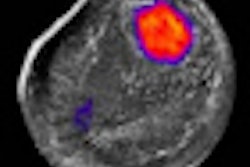A woman's race and ethnicity may influence how quickly she gets diagnosed for breast cancer, more than whether or not she has health insurance, according to research presented at the annual meeting of the American Association for Cancer Research (AACR) in Miami.
Heather Hoffman, PhD, of George Washington University School of Public Health and Health Services, and colleagues at the George Washington Cancer Institute conducted a study of 983 women examined for breast cancer between 1998 to 2009 at six hospitals and clinics in Washington, DC.
Among those with private insurance, diagnostic delay time -- or the number of days from an abnormal screening to a definitive diagnosis -- was 15.9 days for white women, 27.1 days for black women, and 51.4 days for Hispanic women. Diagnostic delay times among those with government insurance were 11.9 days for white women, 39.4 days for black women, and 70.8 days for Hispanic women. For those women without insurance, diagnostic delay times were reported as 44.5 days for white women, 59.7 days for black women, and 66.5 days for Hispanic women, according to Hoffman.
In a related study, Heather Young, PhD, of George Washington University, presented data at the AACR meeting that showed that black women with breast cancer living in Washington, DC, are more likely to experience delays in treatment regardless of insurance type, socioeconomic status, and cancer characteristics such as stage and grade.
Young's team used data from the DC Cancer Registry, which captured all cancer cases from 1998 to 2006. The team found that black women were 2.19 times more likely to wait more than two months longer than white women from the time of diagnosis to treatment. The team also found that black women had a mean time to diagnosis of 26.1 days, compared with 14.1 days for white women.
And the disparity appeared to increase over time, according to Young: If these African-American women were diagnosed between 2001 and 2003, they were significantly more likely to wait for treatment than if they had been diagnosed between 1998 and 2000. The gap widened even further between 2004 and 2006.
"There is something about race that we are still not capturing, whether it is different patterns of social support, access to transportation, or family burden," Young said. "Something is causing the disparities in care to persist."
By Kate Madden Yee
AuntMinnie.com staff writer
October 5, 2010
Related Reading
Women of Mexican origin at higher risk for breast cancer, September 3, 2010
Breast cancer kills more uninsured black women, June 24, 2010
Breast-conserving therapy appropriate for black women, May 20, 2010
Highest breast cancer decline seen in affluent white women, February 16, 2010
Study eyes breast screening of minority women, December 9, 2009
Copyright © 2010 AuntMinnie.com




















